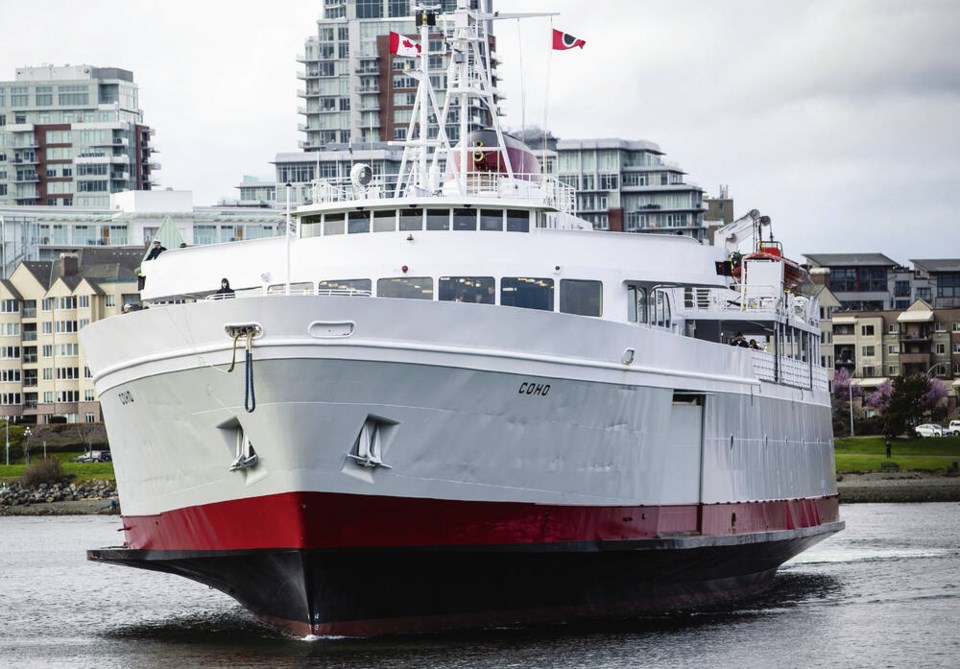Now that the U.S. says it will reopen its border to Canadians in November, Ryan Burles would love to see the MV Coho shuttling back and forth across the strait again — but that doesn’t necessarily mean it will happen.
Have to see the details of the new rules before committing to resuming service for the first time in 20 months, the Black Ball president says. Already the excitement over the White House’s announcement has been tempered by the knowledge that Canadian COVID-testing requirements will keep a lot of travellers at home.
That said, if there are no surprises lurking in the U.S. plans to reopen its land and ferry crossings, there’s a pretty good chance Black Ball will resume its Victoria-Port Angeles run, if only until January.
If it can do so in early November, that should be in time to carry Vancouver Island snowbirds on their annual migration south, and to meet a pent-up demand by Americans wanting to take in the magic of Butchart Gardens or go Christmas shopping on Government Street.
“We would like to operate,” said Burles, whose company has the cushion of U.S. government funding for COVID-stricken transportation businesses.
Again, though, he wants to see some details confirmed. When the U.S. announced Wednesday that it would reopen its borders to fully vaccinated Canadians, word was that all vaccines approved in this country would be accepted, including AstraZeneca. Less certain was whether the U.S. would allow in travellers who have received two types of vaccine. Also uncertain was the precise date of reopening.
Black Ball also wants confirmation that Canadian ferry passengers heading south won’t have to show proof of a recent negative COVID test, as is required of those entering the U.S. by air.
As it is, Canada’s requirement for molecular (usually PCR) tests for anyone sailing north is a barrier that will keep many short-duration travellers at home. Adding a $129 US test at the Port Angeles Walgreens to the Coho’s $39 US return walk-on fare is enough to dissuade some Americans from visiting Victoria for the day.
“The hurdle of the PCR test for Canada is really going to hurt us,” Burles said.
Note that the testing was a factor when the Clipper passenger ferry from Seattle, which had resumed sailing Sept. 17 after Canada began admitting American tourists again, pulled the plug this week, suspending service for the winter. Frankly, says Clipper chief executive David Gudgel, that decision wouldn’t have been changed by Wednesday’s announcement that Canadian tourists, too, will be able to cross the border.
Among the issues: The cost and logistics involved in getting a test were enough to persuade day-trippers — 35 per cent of the company’s passengers — to stay home. “I think that is a huge piece,” Gudgel said. Some passengers were even tripped up by Canada’s requirement that travellers pass a negative test within 72 hours of their arrival in Victoria, not their departure from Seattle.
This isn’t just an issue for Americans. Canadians, too, must show a proof of a negative test (or recovery from COVID) before returning to this country by plane, ferry or road, or before flying into the United States.
If you’re only going to the U.S. for a day or two, you can even get your returning-to-Canada test done on the Island before leaving. Depending on where you go to get tested and how fast you want results, PCR tests on Vancouver Island range from $175 to $375. The B.C. Centre for Disease Control lists four private-testing sites here: Burnside Family Medical Clinic in Victoria, Travel Medicine and Vaccination Centre in Victoria, Whitecap RSC Medical at the Nanaimo airport and Connectus Global at the Victoria airport (a power outage knocked out the latter for a week and a half, but it’s now not only back but ready to expand its hours as of Oct. 18). There are also Far and Away Adventures in Sidney and the Saanich Plaza Medical Clinic.
Whether you see those requirements as striking the right balance probably comes down to perspective on the risk-vs-reward of border opening.
Some Victorians can’t wait to drop $500 on Kraken tickets or chow down on garlic fries at Mariners games, others are desperate to see family in Port Angeles, and still others would be happy to relocate Trump’s wall to Blaine and seal off the border, or at least widen the moat separating Vancouver Island from the rest of the world.
Bit by bit, though, the barriers are falling.
jknox@timescolonist.com



